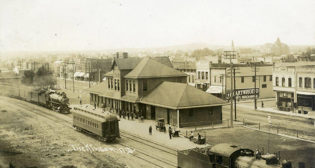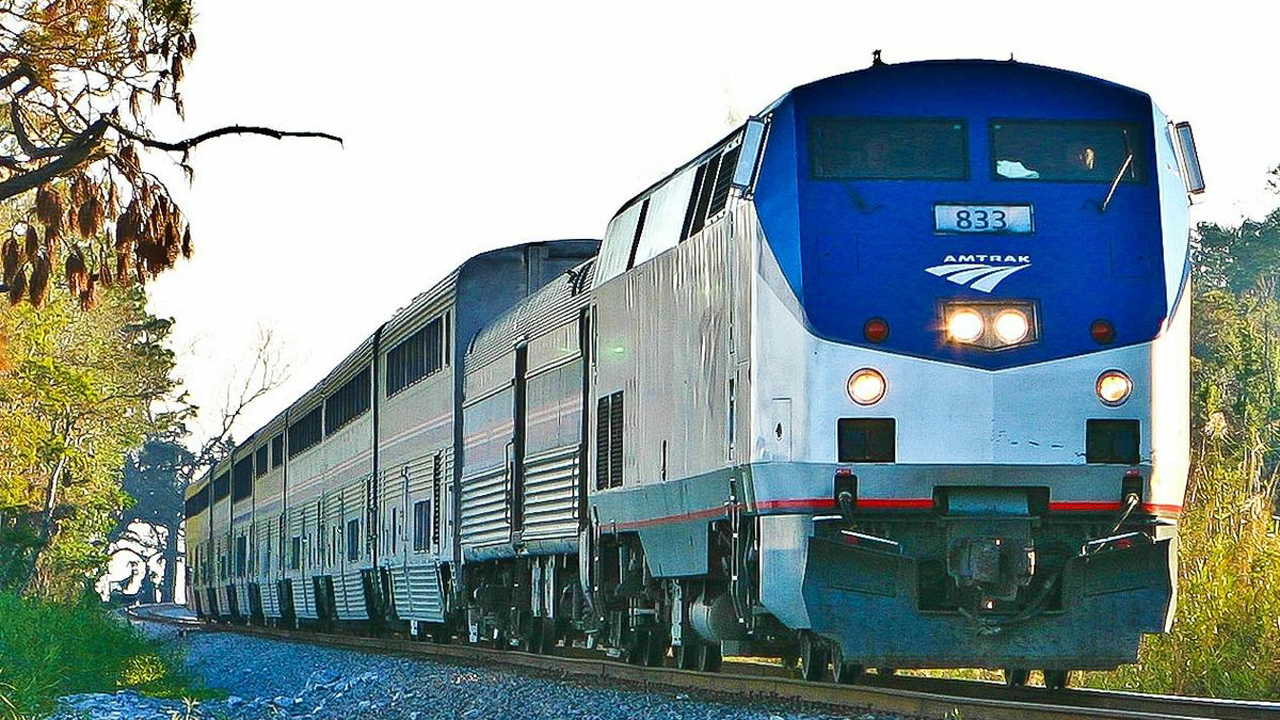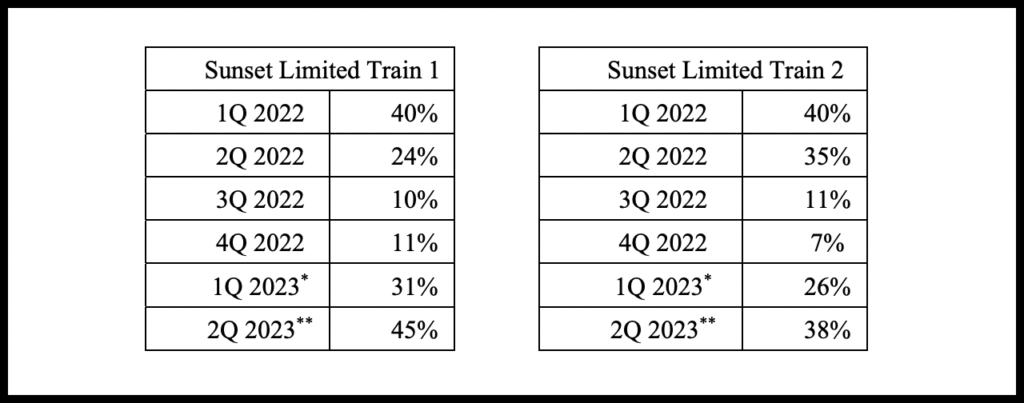
STB Initiates ‘First of its Kind’ Investigation Into Amtrak’s Sunset Limited On-Time Performance
Written by Marybeth Luczak, Executive Editor
The Surface Transportation Board (STB) on July 11 reported that the standard has been met for initiating an investigation into the on-time performance of Amtrak’s Sunset Limited long-distance service between New Orleans and Los Angeles under section 213 of the Passenger Rail Investment and Improvement Act of 2008 (PRIIA), and charted the investigation’s course, which will include fact-finding led by the STB through interrogatories and requirements for production of documents, as well as party-led discovery.
The proceeding was instituted in response to Amtrak’s December 2022 complaint and petition for STB investigation into the “substandard” customer on-time performance of the Sunset Limited, including Trains 1 and 2, and following that investigation, for STB to “undertake remedial proceedings to award Amtrak damages and other appropriate relief.”
Host freight railroad Union Pacific (UP)—which Amtrak said would likely be the prime focus of the investigation—asked the STB on Jan. 27, 2023, to order mediation for Amtrak, UP and the other host railroads involved “to resolve or narrow the issues in dispute.”
Amtrak’s Sunset Limited is a long-distance intercity service between New Orleans and Los Angeles that runs three times weekly. It travels for most of that route over track hosted by UP, in addition to small portions of BNSF and CN trackage.
The STB, in its July 11 decision (download below), explained that “[u]nder PRIIA Section 213, and in conformity with the Metrics and Standards for intercity passenger rail service issued by the Federal Railroad Administration in December 2020 (49 C.F.R. Part 273), an intercity passenger rail service that provides on-time arrivals to fewer than 80% of its passengers for two consecutive quarters may file a complaint with the Board to initiate an investigation.” (STB on Oct. 1, 2022 launched the Office of Passenger Rail to not only investigate the causes of substandard passenger rail on-time performance, but also to identify mitigating measures and, under specified conditions, to prescribe relief.)
According to Amtrak’s filings, “the Sunset Limited performs well below the federal legal standard for on-time performance, and has done so for at least two consecutive quarters. Accordingly, Amtrak has filed a complaint and petition, and the Board must initiate an investigation to determine, first, the cause of delays and failure to achieve minimum standards on the Sunset Limited and, second, whether those delays result from the host railroads’ violations of Amtrak’s statutory right to preference over freight transportation.”
In support of its request for the STB to initiate an investigation, Amtrak provided the following on-time performance data for the Sunset Limited trains:

Amtrak also provided yearly on-time performance averages for the Sunset Limited route for several years prior to the implementation of the FRA Metrics: 2021 (27%), 2020 (30%), 2019 (20%), 2018 (45%), and 2017 (55%). “America’s Railroad” asserted that these figures are a result of issues within UP’s control. “According to Amtrak, many of the delays the Sunset Limited trains encounter are caused by UP’s operational practices,” the STB reported in its decision. “Specifically, Amtrak alleges that UP fails to maintain sidings long enough to accommodate all its freight trains, which results in Amtrak trains getting stuck following a freight train or waiting in sidings. (Id. at 59.) As an example, Amtrak claims that there is a more than 450-mile segment of the route where there are no sidings that can accommodate trains longer than 10,000 feet. (Id.)
“Amtrak also claims that UP fails to plan adequately for the expiration of freight crews, which results in passenger trains being stopped behind freight trains while they undergo crew changes, another operational practice that Amtrak alleges causes delays. (Id. at 60.) Amtrak also claims that its trains are routed to a longer and slower route between Houston, Tex., and Beaumont, Tex., even though this is not the route specified by its operating agreement with UP. (Id. at 60-61.) Lastly, Amtrak claims that UP fails to coordinate with other railroads about the location and handoff of Amtrak trains, which results in greater delays because it precludes other railroads from clearing routes for passenger trains.”
UP, BNSF, and CN each filed replies to Amtrak’s complaint. According to the STB, UP’s reply “argues that the Sunset Limited’s OTP [on-time performance] problems signify that the schedule is not in alignment with the OTP standards developed in FRA Metrics. (UP Reply 3, 5, Jan. 27, 2023.) UP states that it has proposed changes to the schedule that, it claims, would make it reliable and achievable, but alleges that Amtrak has refused to implement those changes. (Id. at 5.) As a result, UP asserts that, ‘Amtrak is asking the Board to commence litigation based on schedules that are not realistic and not compatible with the FRA’s metrics and standards.’
“UP argues that under Amtrak’s proposal, the Board would presuppose that the Sunset Limited is failing to achieve minimum OTP standards because of delays and Amtrak would have the Board investigate only the causes of delays … Instead, UP argues that the Board should start with evaluating whether the schedule is realistic and compatible with FRA’s OTP metric.”
CN wrote in its filing that it would be “unreasonable to require it to commit resources to participate actively in this proceeding,” according to the STB. CN owns 2.2 miles of track over which the Sunset Limited operates and on which there are no passenger stations. The railroad pointed out that it leased this line to New Orleans Public Belt Railroad (NOPB), which is responsible for maintenance; CN retained the right to dispatch the line, according to the STB. CN also said it is not a “host” for the Sunset Limited service “because under FRA’s rules regarding OTP, a ‘host’ is defined as ‘a railroad that is directly accountable to Amtrak by agreement for Amtrak operations over a railroad line segment,’” the STB reported. “CN notes that it has no operating agreement with Amtrak regarding the Sunset Limited service and that Amtrak does not pay CN to use its tracks.” UP has trackage rights over CN’s line and Amtrak operates using UP’s trackage rights, according to the STB. Lastly, CN noted in its filing “that its personnel in charge of Amtrak matters have no recollection of Amtrak having raised concerns about the Sunset Limited service and that the [Amtrak] complaint includes no allegations against CN regarding poor service or delays,” according to the STB.
In BNSF’s filing, it said it “does not object to an investigation and states that it ‘stands ready to participate in this proceeding, and preserves its rights to substantively respond once the Board has established a procedure for conducting its investigation,” according to the STB.
“No party disputes that the statutory trigger for initiation of an investigation under 49 U.S.C. § 24308(f) has been met,” the STB reported in its decision. The agency also noted that it “is not necessary for the Board to determine whether CN is a ‘host’ carrier under FRA Metrics because the Board’s investigation is not limited to ‘hosts.’ Rather, when carrying out an investigation, the Board ‘shall obtain information from all parties involved.’ 49 U.S.C. § 24308(f)(1) (emphasis added). Because of its ownership of the EBJ-Southport Segment over which the Sunset Limited service operates, CN is an involved party to the investigation, even though the segment it owns is a small part of the overall route. While CN leases the segment to NOPB, CN retains dispatching authority, which could bear on the investigation. Because the Board finds that CN is an involved party to this investigation, CN will be required to respond to the Board’s interrogatories and request for documents … For the same reason, both NOPB and the Southern California [Regional] Railroad Authority (SCRRA) will be considered involved parties to the investigation. While NOPB was not named as a host in Amtrak’s complaint, NOPB is listed … as being the owner of the ‘Huey P. Long Bridge (XEBXWB),’ which is ‘hosted and dispatched by UP.’ … Amtrak’s complaint also identifies SCRRA as a host carrier because it owns the final 12.6 miles of track over which the Sunset Limited service operates, from El Monte, Cal., to Los Angeles Union Station … As necessary parties to the investigation, NOPB and SCRRA will also be required to respond to the Board’s interrogatories and request for documents.”
STB’s Procedural Framework
The STB noted that it “has significant discretion regarding how to structure its investigation.” The procedural framework, it said, will be as follows:
- “Investigation liaison. Following the issuance of this decision, the Board will appoint a Board employee as the investigation liaison for the parties. The liaison will play a role analogous to the liaison used in rate reasonableness matters, where the liaison answers questions about the process and intervenes informally if it would help resolve discovery and other issues and keep the process moving smoothly.” According to the STB, the investigation liaison will be appointed by July 14, 2023.
- “Technical conference. The investigation liaison will contact the parties within three business days of service of this decision to schedule a technical conference. This conference will provide guidance on the manner and format for the parties’ responses to the Board.”
- “Investigative Questions and Document Requirements. Appendix A [of the STB decision] contains a list of interrogatories and document submission requirements for the parties. Parts I and II of Appendix A are directed towards all parties, and the remainder applies only to certain parties or a single party.” (Amtrak is directed to respond to Appendix A, Part III, by August 25, 2023; UP and BNSF, individually, are directed to respond to Appendix A, Part IV, by August 25, 2023; CN and SCRRA, individually, are directed to respond to Appendix A, Part V, by August 25, 2023; and UP, BNSF, SCRRA, Amtrak, CN and NOPB are directed to respond to Appendix A, Part II, by July 18, 2023.)
- “Further Board inquiries. Appendix A contains the Board’s initial investigatory questions and is not determinative of the entirety of the Board’s inquiry. After receiving the parties’ responses, the Board may issue more interrogatories and/or document requirements or otherwise seek further information.”
- “Party-led discovery. Parties may engage in traditional discovery for a period of 120 days, unless shortened by agreement of all parties as discussed below. The Board will appoint an Administrative Law Judge to handle any discovery disputes that arise from the traditional party-led discovery process. As in all litigation before the Board, the Board strongly encourages the parties to meet and confer to resolve discovery disputes before seeking formal relief.”
- “Procedural schedule. Once the Board is satisfied that the record is adequately developed, the investigation liaison will reach out to parties for information about the status of party-led discovery. If less than 120 days have passed since service of this decision, the investigation liaison will ask the parties whether they are finished with discovery. Next, the Board will issue a procedural schedule that will include an opening statement from Amtrak (~45 days after discovery ends), an opportunity for replies (~30 days after Amtrak’s opening is due), and a rebuttal from Amtrak (~15 days after replies are due).”
- “End of Stage One. After the parties have presented their case-in-chief, the Board will determine whether and to what extent delays or failure to achieve minimum standards are due to causes that could reasonably be addressed by a rail carrier over whose tracks the Sunset Limited operates or reasonably addressed by Amtrak or other intercity passenger rail operators. If necessary, the Board will also review the accuracy of the train performance data and the extent to which scheduling and congestion contribute to delays. The Board will also make recommendations regarding reasonable improvement measures identified in the course of its investigation. The Board will issue a decision with its findings, including whether delays or failure to achieve minimum standards are attributable to a rail carrier’s failure to provide preference to Amtrak over freight transportation as required under 49 U.S.C. § 24308(c), and recommendations.”
- “Stage Two—Damages and other relief. If the Board determines that delays are attributable to a rail carrier’s failure to provide preference to Amtrak over freight transportation as required under 49 U.S.C. § 24308(c), the Board’s decision at the end of Stage One will include an order for further information if necessary. The format of Stage Two will follow a similar format to Stage One where parties will engage in discovery concurrent with a Board-led inquiry, followed by a presentation of arguments. If necessary, the Board will also provide additional recommendations regarding reasonable improvement measures during this stage.”
The STB pointed out that its procedural framework “is based on the particular issues raised in this case.” It said it will “use this proceeding to inform future on-time-performance cases and will look for opportunities to make such proceedings more expeditious. The Board will also remain open to input from litigants in future proceedings to increase efficiency and shorten the investigative and decisional timelines, if practicable.”
STB also noted that while UP requested STB-sponsored mediation, Amtrak presently opposes it. “While the Board favors alternative dispute resolution whenever possible, the nature of the dispute suggests that mediation prior to record development likely would not be beneficial. Accordingly, the Board will deny UP’s request to order mediation at this time.”
“Today’s [July 11] unanimous decision reflects the Board’s serious commitment to fulfilling its Congressionally established duties under PRIIA to adjudicate disputes over passenger rail on-time performance,” STB Chairman Martin J. Oberman said. “The investigation that we are initiating today is the first of its kind. It involves a significant Board-led component as well as party-led discovery. This framework will ensure that the Board has the information it needs to fulfill its mandate to enforce the preference standards and ensure reliable on-time performance for passenger rail.”
Amtrak Speaks Out
“On behalf of our Amtrak passengers affected by the chronic delays on host railroads, Amtrak is pleased by the Surface Transportation Board’s action to investigate the substandard on-time performance and freight train interference described in our complaint regarding Sunset Limited service,” the railroad said in a July 11 statement. “Amtrak believes vigorous STB oversight is important to improve Amtrak reliability on routes operated over host railroads. The Sunset Limited, Trains 1 & 2, serves a route between New Orleans and Los Angeles, three days weekly, including Houston, San Antonio and Tucson, primarily under the control of Union Pacific Railroad.”



